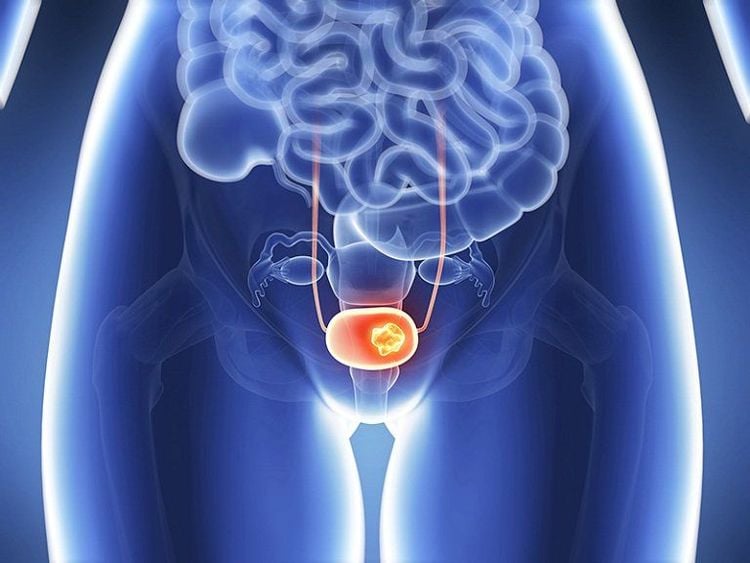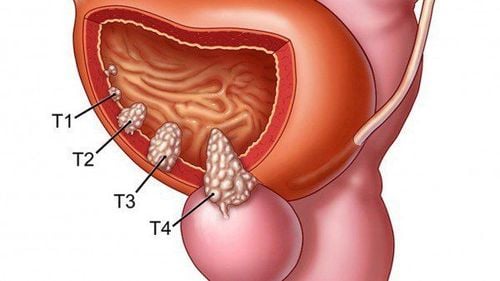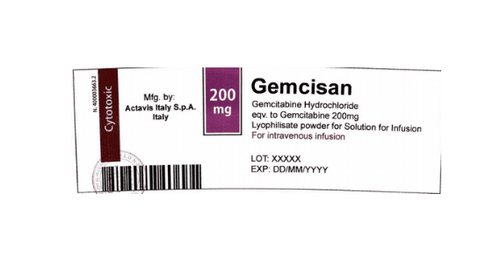This is an automatically translated article.
Like other cancers, bladder cancer also goes through many stages, progressing from mild to severe. Determining which stage the disease is at is very important in the treatment and prognosis of bladder cancer.1. Is bladder cancer dangerous?
According to statistics, currently bladder cancer accounts for about 3% of all cancers. This disease occurs at any age, but the most common age group is between 50-60.Bladder cancer is a very dangerous disease, if not diagnosed and treated early, it can cause many serious consequences, even taking the patient's life at any time.
Some of the consequences of bladder cancer can include:
Bladder cancer leads to bladder fibrosis, making the bladder capacity smaller and even causing reflux of the urinary tract. It is also likely to cause nephritis and kidney edema, which after a period of time will cause kidney damage or urine toxicity; In the early stages, bladder cancer patients will have symptoms such as frequent urination, urgency, pain when urinating; When the tumor is ulcerated combined with inflammation, the bladder will contract, causing the patient to have symptoms of chills, fever...; If the bladder tumor invades wide and deep, or shrinks, the patient will feel pain and mystery. In case the tumor is located in the bladder, there will be symptoms of urinary tract obstruction, urinary retention. If the tumor invades the urinary tract, water retention in the renal calyces will arise and there is inflammation upward, which may cause blood infection; In particular, bladder cancer can cause tuberculosis. Bladder cancer patients with a history of tuberculosis, after antiretroviral therapy, still have abnormal urinary or urinary symptoms.
2. Is bladder cancer curable?
Bladder cancer is a dangerous type of cancer, but if detected early and treated promptly, the success rate of treatment is very high.The ability to successfully treat bladder cancer depends on many factors, including the ability to detect the disease early, the extent of the disease and the patient's health status.

Ung thư bàng quang
3. Treatment prognosis in bladder cancer
Bladder cancer develops through many stages, if in stage 1 and stage 2, the treatment will be very easy, so the patient can live a long time.But when bladder cancer is already in stage 3, meaning that the tumor has started to invade outside the bladder surface and surrounding tissues, doctors will have to do tests to surgically connect with the method. With radiation therapy and chemotherapy to remove the bladder and lymph nodes, the survival rate at this stage is only about 40%.
If the disease is detected at stage 4, the survival rate is only about 20% because at this time the disease has metastasized to the bones, lungs and liver. Doctors only do all kinds of methods to prolong the patient's life in a short period of time, at this time the patient's quality of life is also very poor
In fact, how long bladder cancer lives depends on What stage is the disease and how is the patient's condition, how is the treatment conducted.
4. Bladder cancer treatment protocol
Treatments for bladder cancer include:4.1 Surgery One of the following types of surgery may be done:
Laparoscopic surgery (TUR): Surgery done through a cystoscope. (a thin tube is inserted into the bladder through the urethra). A tool with a small wire on the end used to remove cancer or burn away a tumor with high-energy electricity;
Total cystectomy: Surgery to remove the bladder and remove the lymph nodes and nearby organs that contain cancer. This surgery may be done when bladder cancer has invaded the muscle wall, or when superficial cancer has spread to most of the bladder. In men, nearby organs that are also removed are the prostate and seminal vesicles. In women, the uterus, ovaries, and part of the vagina are also removed. Sometimes, because the cancerous lesion has spread beyond the bladder and cannot be completely removed, a cystectomy may be done just to relieve the urinary symptoms caused by the cancer. Once the bladder has been removed, the surgeon will create another way to get urine out of the body;
Partial cystectomy: Partial cystectomy may be performed for patients with low-grade tumors that have invaded the bladder wall but are limited to one area of the bladder. optical. Since only part of the bladder is removed, patients can urinate normally after surgery
Urine Transfer: This surgery aims to create a new way to store and remove urine from the body.
After the doctor removes all of the cancer visible at the time of surgery, some patients may receive chemotherapy after surgery to destroy any remaining cancer cells. Treatment given after surgery to reduce the risk that the cancer will return is called adjuvant therapy.
4.2 Radiation Therapy Radiation therapy is a cancer treatment that uses high-energy X-rays or other types of radiation to kill cancer cells or keep them from growing. There are two types of radiation therapy:
External radiation therapy: Using a machine outside the body to deliver radiation to the cancer; Internal radiation therapy: Radioactive material sealed in a needle, seed, wire, or catheter is placed directly into or near a cancerous lesion. The type of radiation therapy given depends on the stage of the cancer. External radiation therapy is used to treat bladder cancer.

Xạ trị điều trị ung thư bàng quang
When chemotherapy is given by mouth or injected into a vein, the drug enters the bloodstream and can reach cancer cells throughout the body (systemic chemotherapy); When chemotherapy is given directly into the cerebrospinal fluid, an organ, or a body cavity such as the abdomen, the drugs mainly affect the cancer cells in those areas (local chemotherapy); For bladder cancer, topical chemotherapy can be given into the bladder through a tube inserted into the urethra. The type of chemotherapy will depend on the type and stage of cancer being treated. Multiple chemotherapy is treatment using more than one anti-cancer drug. 4.4 Immunotherapy Immunotherapy is a treatment that uses a patient's immune system to fight cancer. Substances made by the body or manufactured in a laboratory that are used to strengthen, direct, or restore the body's natural defenses against cancer. This type of cancer treatment is also known as biological therapy or biological therapy.
There are different types of immunotherapy:
Immune checkpoint inhibitor therapy: PD-1 inhibitors are a type of immune checkpoint inhibitor therapy used in cancer treatment bladder; ENLARGE; BCG (bacillus Calmette-Guérin): Bladder cancer can be treated with an immunotherapy called BCG. BCG is dissolved in a solution and placed directly into the bladder using a catheter.
5. Treatment of bladder cancer by stage
Depending on the extent of invasion and metastasis, bladder cancer is divided into 5 stages. Each stage will have an appropriate treatment regimen.5.1 Stages 0 and I: Noninvasive papillary carcinoma and carcinoma in situ Treatment for stage 0, I may include:
Endoscopic resection followed by further treatment; Chemotherapy (or BCG) topical after surgery; Partial cystectomy; Total cystectomy. 5.2 Stages II and III: Bladder Cancer Treatment for stage II and III bladder cancer may include:
Partial cystectomy; Combination chemotherapy followed by radical cystectomy. A urine diversion may be performed; External radiation therapy with or without chemotherapy; Partial cystectomy with or without chemotherapy; Endoscopic resection of the tumor. 5.3 Stage IV Bladder Cancer Treatment for stage IV bladder cancer that has not spread to other parts of the body may include the following:
Chemotherapy; Partial cystectomy or followed by chemotherapy; External radiation therapy with or without chemotherapy; Cystectomy as palliative therapy to relieve symptoms and improve quality of life. Treatment for stage IV bladder cancer that has spread to other parts of the body, such as the lungs, bones, or liver, may include the following:
Chemotherapy with or without local treatment (surgery) surgery or radiation therapy); Immunotherapy (Immune checkpoint inhibitor therapy); External radiation therapy to relieve symptoms and improve quality of life; Urine transfer: Surgery to create a new way for the body to get urine out of the body; Treatment for recurrent bladder cancer depends on previous treatment and where the cancer has recurred. Treatment for recurrent bladder cancer may include:
Combination chemotherapy; Immunotherapy (Immune checkpoint inhibitor therapy); Surgery for superficial or localized tumors. Surgery may be followed by biological therapy and/or chemotherapy; Radiation therapy as palliative therapy to relieve symptoms and improve quality of life.
Please dial HOTLINE for more information or register for an appointment HERE. Download MyVinmec app to make appointments faster and to manage your bookings easily.













